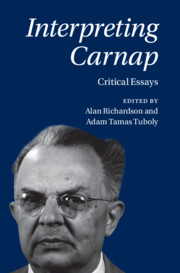Book contents
- Interpreting Carnap
- Interpreting Carnap
- Copyright page
- Contents
- Contributors
- Acknowledgments
- Abbreviations
- Introduction
- Part I Philosophy in New Dress
- Part II Naturalism and Method
- Part III The Logical and the Linguistic
- Part IV Science and Theories
- Chapter 12 Carnap on Theories and the Methods of Science
- Chapter 13 Carnap on Unity of Science
- Chapter 14 Carnap on Determinism and Free Will
- Bibliography
- Index
Chapter 14 - Carnap on Determinism and Free Will
from Part IV - Science and Theories
Published online by Cambridge University Press: 01 February 2024
- Interpreting Carnap
- Interpreting Carnap
- Copyright page
- Contents
- Contributors
- Acknowledgments
- Abbreviations
- Introduction
- Part I Philosophy in New Dress
- Part II Naturalism and Method
- Part III The Logical and the Linguistic
- Part IV Science and Theories
- Chapter 12 Carnap on Theories and the Methods of Science
- Chapter 13 Carnap on Unity of Science
- Chapter 14 Carnap on Determinism and Free Will
- Bibliography
- Index
Summary
It may seem odd that Rudolf Carnap chose to include in his philosophy of science textbook a whole chapter on the problem of free will and determinism. The problem, or better a tangle of related problems, had exercised metaphysicians and ethicists for thousands of years. And by his own account Carnap engaged in neither metaphysics nor ethics and wanted to leave traditional philosophy behind him. So, on the face of it, the chapter presents us with a puzzle about Carnap as well as about free will and determinism. Rather than a full treatment of the traditional issues, the chapter was a response to a then recent paper by Hans Reichenbach that argued that the deterministic laws of classical physics preclude genuine choice as well as any meaningful freedom. Reichenbach goes on to argue that if, however, the fundamental laws are statistical as in quantum mechanics, both choice and freedom are restored. Carnap rejects both of Reichenbach’s conclusions and in the process addresses questions about how we are to understand laws of nature and causation as well as freedom and choice. This chapter examines and assesses Carnap’s arguments and asks whether they amount to a deviation from his anti-metaphysical stance.
- Type
- Chapter
- Information
- Interpreting CarnapCritical Essays, pp. 270 - 285Publisher: Cambridge University PressPrint publication year: 2024

